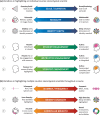Highlighting Counterstereotypical Scientists in Undergraduate Life Science Courses
- PMID: 40184170
- PMCID: PMC12286632
- DOI: 10.1187/cbe.24-02-0082
Highlighting Counterstereotypical Scientists in Undergraduate Life Science Courses
Abstract
Increasingly, curricular materials for undergraduate life science courses are designed to highlight scientists with identities and backgrounds that counter historical and stereotypical representation in science. In this essay, we characterize the wide variation in the development and implementation of these curricular materials featuring counterstereotypical scientists. Applying the Social Ecological Model of Behavior Change as a framework, we examine both personal and social elements of the benefits and costs related to designing and implementing curricula featuring counterstereotypical scientists from the perspective of three groups: students, instructors, and the featured scientists. The benefits of these materials for students are well documented, and we consider how these materials may likewise benefit instructors and the featured scientists themselves. However, we emphasize that, if not developed and implemented with attention to the diversity of personal, social, and contextual factors, such well-intentioned efforts may be ineffective or impact groups in inadvertent ways. Finally, we offer recommendations for highlighting counterstereotypical scientists in curricula. We call for additional research to effectively develop and implement materials featuring counterstereotypical scientists in ways that maximize benefits and limit possible costs to students, instructors, and the featured scientists.
Conflict of interest statement
Conflicts of Interest: M.K.K. and E.H.S. are co-creators of Data Nuggets, A.Z. is a co-creator of Project Biodiversify, and R.M.P. and S.Y. are co-creators of BioGraphI. D.O. previously supported the development of the Scientist Spotlights website. No promotion of a particular product to the exclusion of other similar products should be construed.
Figures
References
-
- Ahn, J. N., Hu, D., & Vega, M. (2020). “Do as I do, not as I say”: Using social learning theory to unpack the impact of role models on students’ outcomes in education. Social and Personality Psychology Compass, 14(2), e12517. 10.1111/spc3.12517 - DOI
-
- Aikenhead, G. (2002). Whose scientific knowledge? The colonizer and the colonized. Counterpoints, 210, 151–166.
-
- Allen, K.-A., Gallo Cordoba, B., Ryan, T., Arslan, G., Slaten, C. D., Ferguson, J. K., … Vella-Brodrick, D. (2023). Examining predictors of school belonging using a socio-ecological perspective. Journal of Child and Family Studies, 32(9), 2804–2819.
-
- Allen, K.-A., Vella-Brodrick, D., & Waters, L. (2016). Fostering school belonging in secondary schools using a socio-ecological framework. The Educational and Developmental Psychologist, 33(1), 97–121.
MeSH terms
Grants and funding
LinkOut - more resources
Full Text Sources
Miscellaneous



